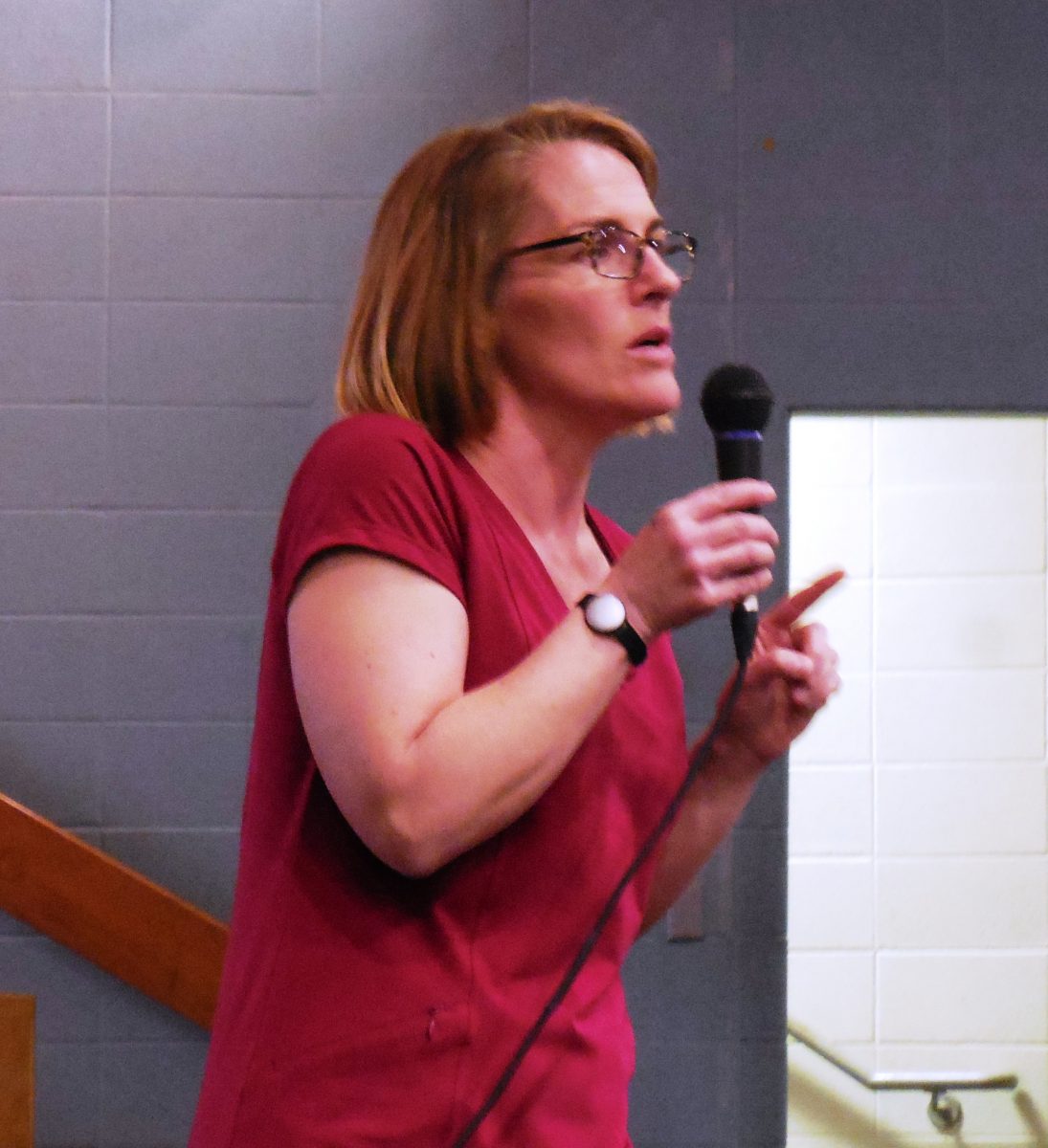WESTFIELD- Northfield resident Ruth Potee, M.D., spoke at a forum on opioid abuse at Westfield High School Wednesday evening, to a crowd of about 200 people.
Potee is a physician with Valley Medical Group in Greenfield, with special interests in women’s health, pediatrics, addiction treatment, psychiatric illness, and pain management.
Since 2013, she has co-chaired the Healthcare Solutions of the Opioid Task Force of Franklin County and North Quabbin, and since 2012 has served as the school physician for the Pioneer Valley Regional School District, encompassing a regional high school and four elementary schools. As school physician, she has provided training and curriculum for school nurses throughout western and central Massachusetts on adolescent substance abuse and addiction. Additionally, she is the medical director for the Franklin County House of Corrections, a position she assumed in 2014, that oversees care for 300 inmates in the county.
In 2015, Potee was honored by her physician peers of the Franklin District Medical Society as the district society’s 2015 Community Clinician of the Year, an honor recognizing her professionalism and contributions as a physician.
Potee spoke about addiction and the teenage brain, beginning with an overview of brain chemistry. She said dopamine is the neurotransmitter that gives humans a sense of joy. It is associated with fine motor skills, and also compulsiveness and perseveration, she said, which she called “helpful behaviors when it comes to survival.”
Most people have an average dopamine level of 100. Very positive people might have a slightly increased level of 105-110, while slightly depressed people might average 85. She called the levels a combination of genetics and bad luck.
Potee said dopamine spikes occur during certain activities. Sex, for example, causes a spike to 200, which is natural. Drug use also causes dopamine spikes at the following rates: cocaine to 350, heroin 500-900, and crystal methamphetamine 1,200-1,300.
The problem of addiction begins because these spikes influence the neurotransmitters, Potee said.
“Nothing in evolution allows that high a level,” she said. “The brain will turn off the production (of dopamine), and suck it all out.”
Poteen said the new baseline after using drugs will be a dopamine level of 45.
“For people to feel normal again, they have to keep using,” she said, referring to it as a “broken brain.”
“Every disease causes some disruption in the message system,” Potee said, adding that the “disease called addiction” affects 10 percent of the population.
Poteen said three things pre-dispose people to addiction: genetics, early exposure, and history of trauma.
“Fifty percent of all addiction is genetic in nature,” Potee said. “If you do not use until 25, you won’t develop addiction.”
Potee said of the people who start drinking at age 15, 40 percent will become alcoholics, while among those waiting until age 21, only 7 percent will develop the disease.
Potee also came down hard on marijuana during her talk, calling it the number one drug of abuse. She said students are making “marvelous” decisions when it comes to cigarettes, but at the same time the use of marijuana is going up. Potee called marijuana “an absolutely harmful drug for teenagers.”
“It can set you up for a lifetime of addiction,” she said, adding that the level of knowledge about what marijuana does to the developing brain is zero.
“We do not study marijuana in this country because it is illegal,” Potee said, but pointed to studies in New Zealand and Australia that have studied the impact. She said they have found an 8 point drop in IQ among young users, as well as a decreased graduation rate and university scores. She also said these studies were based on home-grown marijuana, which has 2 percent THC, or tetrahydrocannabinol, the chemical responsible for most of marijuana’s psychological effects, while products being developed in this country have 10-20 percent THC levels and higher.
Potee also objected to products being developed in states such as Colorado which have legalized marijuana for recreational use, and which she said are marketed to children. Potee said she will be voting “no” on the ballot question to legalize recreational use of marijuana in Massachusetts.
Potee said she got involved in speaking about addiction after reading an obituary in 2012 of a young woman whose family she knew. The obituary listed the cause of death as heroin overdose. Potee called and thanked the grandparents for speaking out.
She blames the rise in overdoses on 20 years of overprescribing pain medications in this country, and as a prescriber, said she feels personally responsible for this epidemic. She urged people in the audience to keep all necessary pain medications under lock and key, and to turn in unused or old prescriptions.
“Kids should never be responsible for their own medications,” Potee said.
A mother of three teenagers, she said her children have to ask her for pain medication and talk about it with her first. She also recommended using Tylenol and ibuprofen together to treat injuries – one of the ways teenagers first get access to opiates.
Potee also stressed the importance of Narcan as the only way to reverse an opiate overdose, and referred audience members who think they might need it to the website getnaloxonenow.org. She said it is also available at Walgreens Pharmacies without a prescription.
Potee praised Westfield’s response to the crisis, acknowledging the recent terrible losses the city has had, and thanking city leaders for acting right away.
“It is a testimony to a small city. It’s an honor to be here,” she said.
She also said Governor Charlie Baker has done “a remarkably good job,” but called the recent legislation “too late, too weak, won’t make a difference,” and repeated the call for more treatment beds.
“Don’t treat people with addiction like they’re the scum of the earth, but actually get them good quality treatment,” Potee said.


